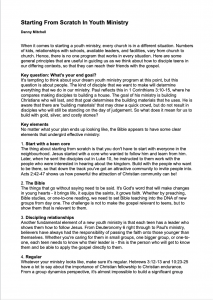When it comes to starting a youth ministry, every church is in a different situation. Numbers of kids, relationships with schools, available leaders, and facilities, vary from church to church. Hence, there is no one program that works in every situation. Here are some general principles that are useful in guiding us as we think about how to disciple teens in our differing contexts, so that they can reach their friends with the gospel.
Key Question: What’s Your End Goal?
It’s tempting to think about your dream youth ministry program at this point, but this question is about people. The kind of disciple that we want to make will determine everything that we do in our ministry. Paul reflects this in 1 Corinthians 3:10-15, where he compares making disciples to building a house. The goal of his ministry is building Christians who will last, and that goal determines the building materials that he uses. He is aware that there are ‘building materials’ that may draw a quick crowd, but do not result in disciples who will still be standing on the day of judgement. So what does it mean for us to build with gold, silver, and costly stones?
Key Elements
No matter what your plan ends up looking like, the Bible appears to have some clear elements that undergird effective ministry:
- Start With A Keen Core
The thing about starting from scratch is that you don’t have to start with everyone in the neighbourhood. Jesus started with a core who wanted to follow him and learn from him. Later, when he sent the disciples out in Luke 10, he instructed to them work with the people who were interested in hearing about the kingdom. Build with the people who want to be there, so that down the track you’ve got an attractive community to invite people into. Acts 2:42-47 shows us how powerful the attraction of Christian community can be! - The Bible
- Discipling Relationships
- Regular
The things that go without saying need to be said. It’s God’s word that will make changes in young hearts – it brings life, it equips the saints, it grows faith. Whether by preaching, Bible studies, or one-to-one reading, we need to set Bible teaching into the DNA of new groups from day one. The challenge is not to make the gospel relevant to teens, but to show them that is relevant to them.
Another fundamental element of a new youth ministry is that each teen has a leader who shows them how to follow Jesus. From Deuteronomy 6 right through to Paul’s ministry, believers have always had the responsibility of passing the faith onto those younger than themselves. Whether you’re caring for them in small groups, one bigger group, or one-to-one, each teen needs to know who their leader is – this is the person who will get to know them and be able to apply the gospel directly to them.
Whatever your ministry looks like, make sure it’s regular. Hebrews 3:12-13 and 10:23-25 have a lot to say about the importance of Christian fellowship to Christian endurance. From a group dynamics perspective, it’s almost impossible to build a significant group identity if teens are only seeing each other fortnightly or monthly. If you’ve got to do less in order to do it more often, the payoff in relationships will make it worth while.
Key tips
- Know your plan (regularly teaching the Bible in relationships), and sell it hard – to church leadership, then to parents, then to kids
- Start with an overnight or camp to spend time talking to the group about who we are and what we do
- What kids come for is what they’ll stay for, so make sure it’s Jesus
- In the early days, be social heavy – have youth group, but then look for as many social opportunities outside of that as you can
- Time is precious and people feel busy, so build relationships by getting kids to do everyday life things together (eg. study, yard work, watch each other’s sports games, etc.)


